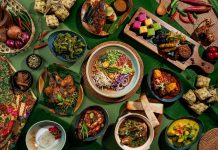One of the great joys of living in Malaysia is the fact that food is abundant, thanks to the diversity of cultures in the country. From nasi lemakbreakfast to a midnight roti canai snack, options are available all day, every day.
In addition to food runs, festive seasons also allow Malaysians to indulge in a variety of spreads – from open houses to restaurant buffets. One of the major pitfalls of this abundance of food is the fact that Malaysians tend to overorder and overprepare meals, which leads to food waste.
The Importance of Environmentally-Friendly Choices

Since 1957 Malaysia, along with the Food and Agriculture Organization (FAO), has supported the country’s National Save Food Network drive to reduce food waste and post-harvest losses. Additionally, the FAO reports that an estimated one-third, or about 1.3 billion tons, of all food produced globally is lost or goes to waste, which contributes to global food insecurity.
It is a harsh reality to consider, but this privilege can also inspire us to make more conscious eating choices.
A recent survey conducted by Herbalife Nutrition around plant-based diets showed that 40% of respondents’ food choices were driven by a desire to be more environmentally-friendly. Reducing food waste is a simple, added bonus that can have a great effect.
How You Can Make a Positive Impact
When planning your family meals there are several ways in which you can help reduce food waste and live more sustainably. Here are five of them:
1) Plan Ahead
Whether you’re meal-prepping nutritious meals for the week, or planning the menu for your next gathering, planning ahead is a great way to ensure you’re preparing only what you can consume and not serving your guests more than they can eat.
2) Cook with More Sustainable Ingredients
People are leaning towards more plant-based diets for a variety of reasons, including health concerns, weight loss, or concerns about the environment. For those who are just starting to experiment, it might be best to adopt a “flexitarian” diet or menu, which is a primarily plant-based diet with the occasional inclusion of meat, poultry, fish or eggs. It’s a great way to maintain a healthy, balanced diet, while helping to protect the environment by cutting down on energy and resources used to produce red meat. There are more and more plant-based foods in the market such as the plant-based ‘meat’ burger patties and pea-based dairy alternatives.
3) Plate Up in the Kitchen instead of at the Table
As Malaysians, we love to serve our guests with a wide variety of items, typically in buffet style. However, at the end of the function, there are always plenty of leftovers that could ‘feed an entire village’, as people commonly say. Consider portioning out your meal in the kitchen. Serving food family-style makes it easy for everyone to help themselves, which is precisely why it’s not such a good idea if you’re trying to control portions, and ultimately avoid food waste. With serving dishes on the table, it’s just too easy to have “just another spoonful.” One of the biggest sources of food waste comes from food left on the plate, which often ends up in the trash.
4) Repurpose Foods that are Reaching Expiration
There are many ways to get the most out of your perishable food items, even when they start to look a little sad. When your tomatoes get too mushy to cut up for salads, consider making them into homemade tomato sauce. Are your bananas getting brown and squishy? Give them more life by unpeeling them and keep them in the freezer as a healthy smoothie ingredient! Soups, stews, salads are great dishes that can incorporate many different ingredients with shorter shelf lives.
5) Donate Extras to those in Need
This year, our government expandedthe Food Bank Malaysia program aimed at helping to reduce the cost of living for local consumers in the B40 group, as well as local university students.If you are clearing out your pantry, consider donating extra shelf-stable food items to local food banks and charities.
The next time you are cleaning out your refrigerator, freezer or pantry, pay attention to what you’ve tossed and make an effort to reduce food waste in the future.

Ready to take action? Download our #NutritionforZeroHunger guide on food waste reduction and make a difference today.
The article is written by Susan Bowerman, Senior Director, Worldwide Nutrition Education and Training, Herbalife Nutrition.
Read also: Herbalife Nutrition Launches New Hair Care Products in Malaysia








